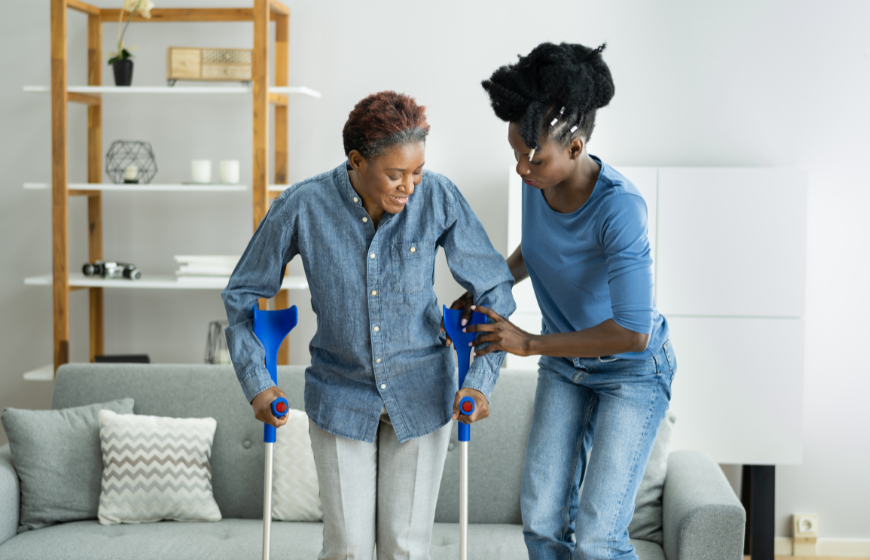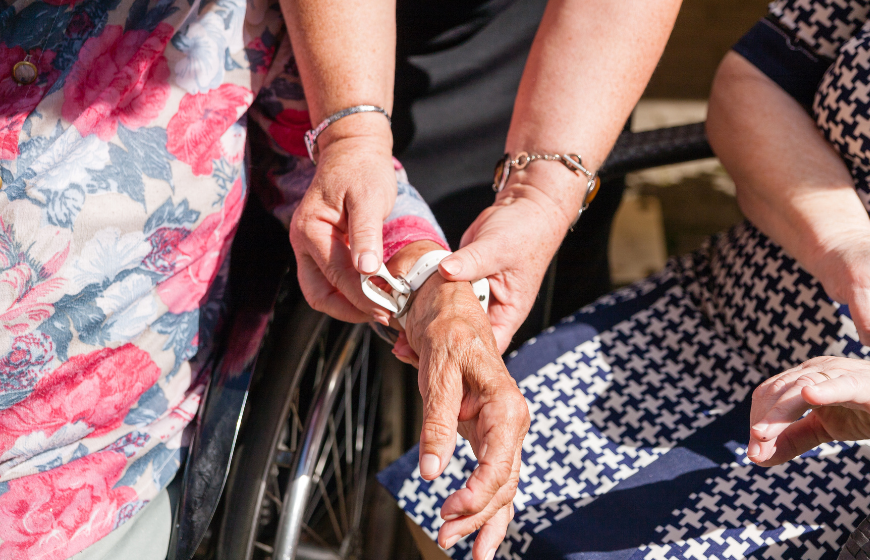Affecting upwards of 30 million Americans and roughly 25% of adults 65 and older, diabetes is a major health concern in the U.S. The chronic disease occurs when a person’s blood glucose (or blood sugar) is too high because the pancreas isn’t generating enough of the hormone insulin.
Glucose, which comes from the food we eat, is the body’s primary source of energy. But since we rely on insulin to process sugars and carbohydrates, a deficiency of the hormone can cause serious health issues. Some diabetics are insulin-resistant rather than deficient, and for others, it’s a combination of the two.
The most common symptoms of diabetes in seniors include a feeling of constant hunger or thirst, frequent urination, blurred vision, and numbness or tingling in the feet and hands. That said, there are distinct differences in type 1 and type 2 diabetes, including the signs and symptoms.
If you suspect you or a loved one is diabetic, the in home health aide services specialists at Alliance Homecare in New York are here to provide guidance and insight. Read on for a breakdown of the various symptoms of type 1 and type 2 diabetes.
Type 1 Diabetes in Seniors
When you have type 1 diabetes, or Insulin-dependent diabetes, the pancreas doesn’t produce enough insulin (or any at all). This means blood sugar isn’t processed properly, and when it can’t get into the cells, it begins to build up in the bloodstream. Commonly referred to as high blood sugar or hyperglycemia, the effect can cause substantial damage throughout the body and is ultimately behind many of the symptoms of type 1 diabetes.
Roughly 12 million seniors in the U.S. have diabetes. And while type 1 is most often diagnosed in children and tends to develop through adolescence, it can occur at any age. Additionally, it’s the less common condition of the two, accounting for only about 10% of all diabetes diagnoses.
Symptoms of Type 1 Diabetes in Seniors
Though uncommon, type 1 diabetes is sometimes diagnosed in adults over age 40 and even into their 50s and 60s. With that said, knowing the warning signs can help you manage the condition and potentially avoid complications down the road.
Symptoms of type 1 diabetes in seniors may include:
- Frequent urination or incontinence
- Feeling thirstier or hungrier than usual
- Fatigue
- Unexplained weight loss
- Blurred vision
- Changes in mood or behavior
Type 1 diabetes can lead to myriad health issues in aging adults, which mostly has to do with the effects of trying to manage blood sugar. Over time, altering glucose levels can damage various organs, ultimately creating ailments throughout the body and making a person more susceptible to certain diseases. This includes hypoglycemia, heart disease, and kidney disease, as well as nerve and eye damage.
Hypoglycemia
Hypoglycemia, which is different from hyperglycemia, means someone has exceedingly low blood sugar levels. Those with type 1 diabetes may be susceptible to developing the condition, which is particularly concerning in seniors, as even brief episodes can lead to fainting, falling, comas, or seizures.
Heart Disease
Adults over 65 are already substantially more likely than the younger population to develop heart disease, which poses an increased risk for strokes, heart attacks, and coronary artery disease. Sadly, seniors with type 1 diabetes often have an even greater chance of suffering from one of these cardiovascular conditions.
Kidney Disease
Elderly individuals with type 1 diabetes may experience damaged blood vessels in their kidneys. In severe cases, kidney disease can develop, in which the vital organs don’t work properly and may require dialysis to purify the blood as well as continuous nursing care for chronic kidney disease. According to the National Kidney Foundation, about 30% of folks with type 1 diabetes suffer from kidney failure.
Nerve Damage
A high blood glucose level can hinder the vessels responsible for delivering blood throughout the body, which essentially means blood isn’t circulating properly. At first, poor circulation might cause tingling or numbness, but in severe cases, it can lead to nerve damage and a permanent loss of feeling in the feet and toes.
Eye Damage
Blurry vision is often one of the first signs of type 1 diabetes in seniors. In some cases, it can progress to permanent eye damage, which occurs when a high blood glucose level damages blood vessels in the retinas.
Type 2 Diabetes in Seniors
As the most common type of diabetes, type 2 accounts for roughly 90% of cases. That said, it’s also more preventable and treatable than type 1, especially if it’s caught in the prediabetic stage.
Around 10 million seniors in the United States have type 2 diabetes, which occurs when the body doesn’t use insulin properly. When the condition is diagnosed later in life, it’s most often a result of obesity. In an attempt to process high levels of sugar in the blood, the pancreas generates an excess of the hormone, but over time, people develop a buildup of glucose in their bloodstream.
Symptoms of Type 2 Diabetes in Seniors
Many people with type 2 diabetes mellitus live long and healthy lives, but if the condition isn’t monitored and appropriately managed, it can lead to severe medical issues. Knowing what to look out for can help you take action sooner than later.
Symptoms of type 2 diabetes in seniors may include:
- Heightened thirst or increased hunger
- Tiredness
- Frequent urination or incontinence
- Vision problems
- Unintentional weight loss
- Skin infections
- Slow healing from bruises or cuts
Since elderly individuals tend to expect their health to slowly deteriorate, many mistake the gradual onset of type 2 diabetes symptoms with the normal aging process. As a result, the disease can progress slowly and go unnoticed until it becomes severe.
When type 2 diabetes isn’t detected in the prediabetic stage, or when treatment plans aren’t followed later in life, it can lead to more serious health issues. Like type 1 diabetes, type 2 is one of the leading causes of kidney failure and permanent eye damage, including adult-onset blindness.
Additionally, over 70% of diabetic adults are treated for hypertension, which can lead to other heart-related ailments. Seniors with type 2 diabetes, in particular, are also more likely to suffer from heart attacks and strokes.
Type 2 Diabetes Risk Factors in Aging Adults
The most obvious risk factor for type 2 diabetes is prediabetes, but as we mentioned, seniors aren’t always aware they have it. Old age, obesity, poor nutrition, and a sedentary life increase a person’s risk. Genetics play a role, too, so if a close relative is diabetic, you’re more likely to develop the condition.
Treatment for Diabetes in Seniors
The symptoms of diabetes in seniors shouldn’t be ignored or brushed off as a normal part of getting older. While there is currently no cure for the chronic disease, lifestyle changes and medical treatments can keep symptoms and complications at a minimum.
Managing diabetes requires ongoing daily effort, which can be a challenge for some seniors. But if left unmanaged, both types can create serious and often irreversible health problems relating to the kidneys, eyes, and limbs. This is where CCM or chronic care management comes in. You might be asking, “What is chronic care management?” It is additional health care assistance for managing any chronic condition.
Treatment for diabetes varies from case to case. However, many plans include dietary changes, increased physical activity, insulin injections, and other medications that support healthy blood glucose levels.
Costs for the treatment and management can be covered by Long Term Care Insurance (LTCI). What is long term care insurance? It is a healthcare policy that covers most of the healthcare costs for the elderly, other than treatment costs for Diabetes, there is also coverage from multiple sclerosis to cancer, among others.
Diabetes Home Care in the New York Metro Area
Diabetes and other chronic illnesses can be difficult for aging adults and their loved ones in the caregiving role, as it requires diligent daily management to keep it under control. If you or someone dear to you needs in home nurse care support for type 1 or type 2 diabetes, Alliance Homecare is here to help.
We work with patients and their families to develop personalized plans that make sense for everyone involved. A typical diabetes home care plan might include establishing a daily routine, nutritional guidance, supervising the management of the blood sugar level, monitoring symptoms, managing complications, meal planning and prep, administering insulin shots, and providing education and resources about the disease.
Our skilled registered nurses and home health aides offer compassionate care to each and every patient while they continue living in the comfort of their homes. If you’re interested in arranging in-home care in New York, need more information about the benefits of home care services, or have questions about our services, please don’t hesitate to contact us.
External sources:
- https://www.cdc.gov/diabetes/pdfs/data/statistics/national-diabetes-statistics-report.pdf
- https://www.niddk.nih.gov/health-information/diabetes/overview/what-is-diabetes
- https://www.cdc.gov/diabetes/basics/what-is-type-1-diabetes.html
- https://www.nia.nih.gov/health/diabetes-older-people
- https://care.diabetesjournals.org/content/35/12/2650
- https://www.mayoclinic.org/diseases-conditions/type-2-diabetes/symptoms-causes/syc-20351193
- https://www.niddk.nih.gov/health-information/diabetes/overview/what-is-diabetes
- https://www.nia.nih.gov/health/heart-health-and-aging
- https://www.kidney.org/atoz/content/diabetes





